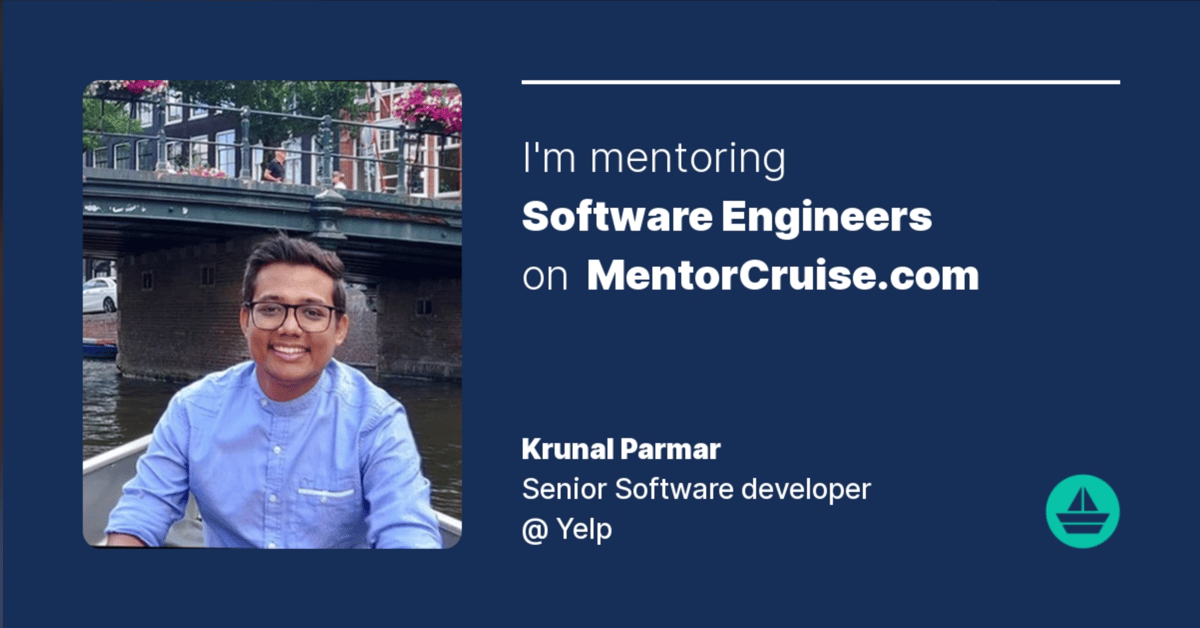“Mentor is like a guiding light in the dark forest” — Unknown
“A mentor is someone who allows you to see the hope inside yourself.” — Oprah Winfrey
As a software developer, I have had the opportunity to work with some of the most innovative and successful companies in the industry. But, in addition to my technical skills, I believe that my experience as a mentor has been just as valuable to my professional development.
For the past three years, I have been mentoring young professionals, providing guidance on technical and non-technical skills, and helping them achieve their career goals. Through this experience, I have learned that mentoring is not just about imparting knowledge, but also about fostering a sense of collaboration, trust, and mutual respect.
One of the most rewarding aspects of mentoring is the ability to see the progress and growth of my mentees. I have had the pleasure of mentoring individuals who are now working at some of the top product-based companies around the world. It is truly fulfilling to see them achieve their goals and make a positive impact in their respective organizations.
Here are 7 Lessons I learned over the past 3 years.
- Listen more than you talk: Good mentors understand the importance of active listening. They listen more than they talk, and they are always willing to hear their mentee’s thoughts, concerns, and ideas.
- Provide honest and constructive feedback: A mentor should be willing to provide honest and constructive feedback to their mentee. This feedback should be given in a positive and supportive manner, to help the mentee to improve and to achieve their goals.
- Encourage independence: A mentor should encourage their mentee to think independently and to take ownership of their development. This means giving them autonomy and allowing them to make their own decisions.
- Share your own experience and knowledge: A mentor should be willing to share their own experience and knowledge with their mentee. This includes sharing the lessons they have learned, the mistakes they have made, and the successes they have had.
- Be a sounding board: A mentor should be a sounding board for their mentee, providing a safe space for them to share their thoughts, concerns, and ideas. By providing a non-judgmental and supportive environment, a mentor can help their mentee to think more critically and to make better decisions.
- Provide guidance and support: A mentor should provide guidance and support to their mentee. This includes helping them to set goals, providing resources and connections, and offering advice and insights.
- Be flexible and adaptable: A mentor should be flexible and adaptable in their approach, recognizing that each mentee is unique and may have different needs and goals. They should be able to adjust their style and approach to best support the mentee, whether it’s providing hands-on training or simply being a listening ear.
How to Find the Right Mentor and Make the Most of the Relationship?
As a novice software developer, I initially had little understanding of the value of mentorship. Like many others, I attempted to navigate my career independently. However, I found myself repeatedly facing obstacles. A colleague with more experience eventually stepped in to assist me, and this experience opened my eyes to the benefits of seeking guidance from others in advancing my professional development and achieving my goals more efficiently.
Mentoring can be an incredibly valuable experience for both the mentor and mentee. A mentor can provide guidance, support, and valuable insights to help mentee navigate their professional and personal growth. Finding the right mentor can be a daunting task, but with a little bit of effort and a clear understanding of what you’re looking for, it can be a very rewarding experience.
The first step in finding the right mentor is to define your goals.
What do you hope to achieve through mentorship?
- Are you looking to develop specific skills or gain knowledge in a particular field?
- Are you looking for guidance on how to navigate your career or personal life?
Once you have a clear understanding of your goals, you can begin to look for a mentor who can help you achieve them.
Platforms like mentor-cruise can help a really good mentor who can help you achieve your goal faster & more effectively.
If you want to get mentored by me, here's my mentorcruise profile. https://mentorcruise.com/mentor/krunalparmar/

Way Forward
Once you’ve found a mentor, it’s important to establish clear expectations for the relationship. Discuss your goals with your mentor and come up with a plan for how you will work together to achieve them. Make sure to establish a schedule for meetings or check-ins and decide how you will communicate.
It’s also important to remember that mentorship is a two-way street. As a mentee, it’s your responsibility to be prepared for meetings and to actively work on achieving your goals. It’s also important to be open and honest with your mentor about your progress and any challenges you may be facing.
To make the most of the mentorship, it’s important to be open-minded and take advantage of all the resources your mentor has to offer. Your mentor has a wealth of knowledge and experience, and they are there to help you. Ask questions and seek out their advice. Don’t be afraid to challenge yourself and try new things. A good mentor will be there to support you and help you achieve your goals.
Finally, it’s important to remember that mentorship is a learning experience. You will not become an expert overnight and you will make mistakes, but that’s all part of the process. A good mentor will help you learn from your mistakes and continue to grow and develop.
In conclusion, mentoring is a powerful tool for professional development. It provides an opportunity for individuals to learn from experienced and successful professionals, and to gain the knowledge, skills, and confidence needed to succeed in their field. Through mentoring, both the mentor and mentee can grow and develop, building a relationship based on trust, respect, and mutual support. The lessons shared in this article are only a few of the many important aspects of mentoring. It’s a fulfilling journey for both mentor and mentee, and it’s an opportunity for them to make a positive impact on each other’s lives.


